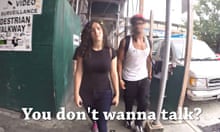Last month, a group of lads chased me down the street making kissing noises. They were "only having a laugh", they said afterwards, which somehow didn't make me feel much better. Around the same time, a friend was getting off a bus during rush hour when she felt a hard slap on her bottom, and looked around to see a man grinning at her. Almost every woman I know has stories of wolf whistles, catcalls and unwanted propositions whispered in their ear, and street harassment can often feel inescapable – especially come summer.
Sometimes the attention is distinctly sinister. "I'm usually a jeans-and-trainers kind of girl," says Sarah Francis, "but a couple of weeks ago, well into the hot weather, I finally buckled and put on a dress." Shortly after leaving her house, Sarah realised a man was following her, making crude remarks. When she didn't respond, he started kicking her feet. "Suddenly I felt a terrible pain on the back of my head, and when I turned around I saw he was throwing stones at me." Sarah ducked into the nearest open doorway, her leg bleeding, and two builders helped her out. The violence she suffered was clearly more extreme than the average street harassment, but her feelings will be depressingly familiar to many women. "I was shaking and scared," she says, "and I felt angry that he had intimidated me."
Emily May, founder of the anti-street harassment website iHollaBack.org, says women regularly express these sentiments when visiting the New York-based site. HollaBack offers people the chance to upload pictures of their harassers, with a description of what happened – often a woman will just post a few lines explaining where she was when someone walked up and said: "I want to fuck you." The response from fellow readers is always supportive. "Women tend to just brush off the odd nasty comment or quick grope," says May, "but the goal of HollaBack is to externalise an experience which can make women feel ashamed, intimidated or depressed." There are HollaBack websites for Mauritius, Chicago and Toronto, and a UK site has just been started by 22-year-old Julia Gray. "The site gives women an outlet for their frustration," says Gray, "and promotes recognition that this is a widespread problem." Both Gray and May feel that the anti-street harassment movement is gaining momentum fast.
One woman who felt compelled to act is 25-year-old Vicky Simister, a financial analyst, who has found street harassment particularly problematic since moving from Ireland to London for work. "I was walking down a busy road in the middle of winter," she says, "wearing a huge jacket, when these two guys slowed their car down to pay me 'compliments' about my appearance. This escalated into sexual comments. I eventually lashed out in frustration, and they got out of their car and ran after me, physically assaulting me. The police were called, but I wasn't happy with their response. One said: 'They said they were following you, but only to say nice things.'"
After this, Vicky set up the London Anti-Street Harassment campaign (Lash), to lobby MPs and journalists, and begin a serious debate. "I want women to put their hands up and say: 'We don't want to be treated like this,'" she says, "and I want men to realise the impact their words and actions have."
It's often suggested that street harassment is inevitable. But, as May says, while it might not be considered "as serious as domestic violence or sexual assault, street harassment is on the same spectrum of violence against women." The fact that it is so often just accepted by people suggests women's bodies are still considered public property – an attitude the anti-street harassment movement aims to change.





Comments (…)
Sign in or create your Guardian account to join the discussion